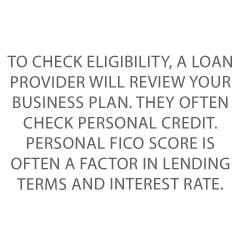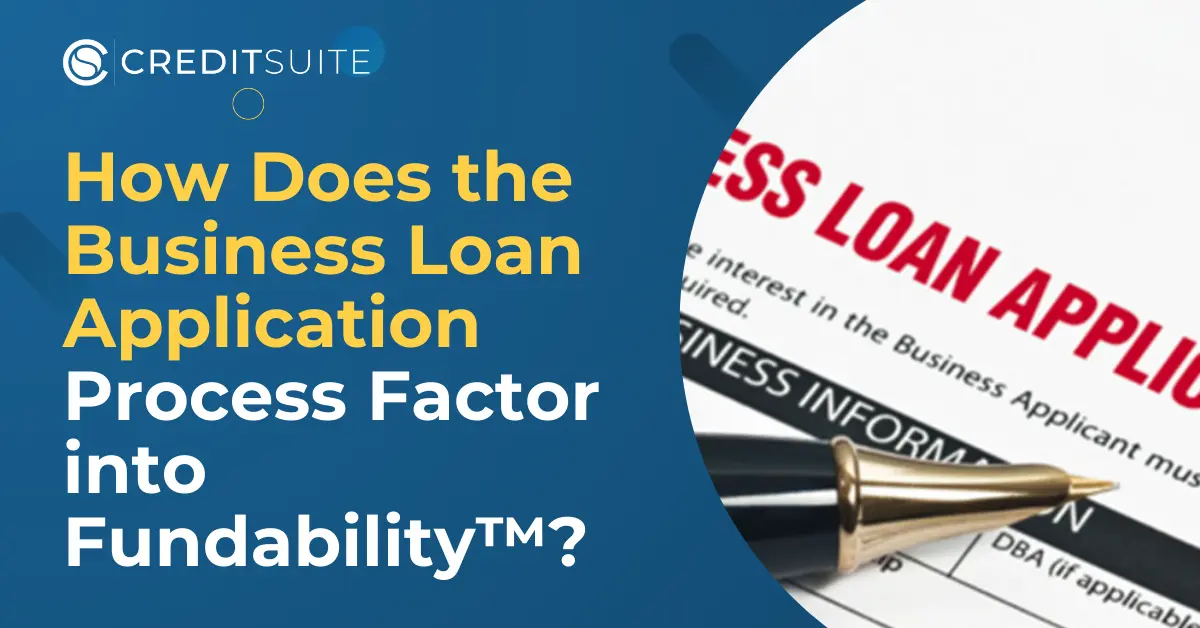Did you know that the business loan application process is a factor in Fundability™?
When businesses want to get small business loans, one factor is the application process.
The Small Business Loan Application Process
For owners of small businesses, an application for a business loan may seem cut and dried. You fill it out and a lender gives you money. Or not. You either have good enough creditworthiness to meet their qualifications, or you just plain don’t.
What to Expect When Applying for Small Business Loans
For a loan program administered by a bank or other traditional lender, the process will, in part, involve you providing documentation. For credit approval, any lender wants to know you will repay the loan.
Commonly requested documents include a business plan, business tax returns, and personal tax returns. A lender may want to know about your business goals.
Personal Guarantee
For virtually all business loans, particularly if your business is new, you will need to provide a PG. Hence, you provide personal details and they will likely perform a ‘hard pull’ to check your credit history.
To check eligibility, a loan provider will review your business plan. They often check personal credit. Personal FICO score is often a factor in lending terms and interest rate.
Better personal credit always helps a business get better financing terms, including a lower loan cost.
With your business lending application, if you have bad credit, the loan provider will determine you have better eligibility for credit approval if you can have a guarantor cosign the loan.
Details on Typical Applications for Business Loans
On your application for a business loan, you will probably be asked for your Social Security Number. A lender may want to check the operating history of your business. You may need to list both business assets and personal assets. The lender will want to know how much business debt you carry.
A lender will want to know your business credit score and probably also your personal FICO score—even though these aren’t personal loans.
The Small Business Loan Process
Did you know that you can negotiate more competitive interest rates for your business? Yes, you can, even for standard loans.
Loan Usage and Purpose
Business lenders will ask why you want a working capital loan. They’ll check your records to see how your existing business operates—like whether you’re getting reliable cash flow. A lender wants to see you’re responsible.
One excellent use for working capital is for unexpected expenses. Growing businesses can often handle the usual, like rent. But replacing a widget maker is different.
Does the Right Loan Have to Come From a Bank?
No! While most businesses turn to a local lender for a business loan, it may not be the best fit.
Choose a Lender That Understands Your Niche
Banks are not all alike. If your small business is of a type which often can’t get a loan, try another lender. Just Google your industry lending or your industry loans. E.g., medical cannabis loans. Or try the word financing.
Do some digging, particularly if you have never heard of the lender. Check rating sites like the Better Business Bureau and Google Reviews. Recognize that some reviews are from people with an axe to grind.
If borrowing rates or monthly payments look too good to be true, or anything else feels off, then select a small business loan elsewhere.
Small Business Administration Loan Options
Beyond a traditional lender, many small business owners may look to the SBA for financing. But SBA loans can be hard to get. Beyond the usual documents, the SBA will want a resume, business bank statements, and documentation of personal finances.
Still, loan terms are better and Small Business Administration loan funds are guaranteed. Hence, your standard member FDIC lender is more inclined to say yes.
Keep in mind, it can take much longer to receive funds from the SBA. Hence, it is not a great choice for more immediate cash.
You can get up to $5 million from the SBA. The SBA also offers very long payment terms. For SBA borrowing, you need a high FICO score. And the SBA wants to see company tax returns showing a profit. The SBA wants to view personal income tax returns, too.
Alternative Business Funding Options
Does it absolutely have to be a small business loan? Does it have to involve a regular lender or the Small Business Administration?
Not necessarily.
Consider other small business financing options. You may find they suit your business better than term loans.
A small business owner with a bad FICO score might not meet the qualifications for a loan from a bank or SBA financing.
But there are other small business financing choices. Consider your specific small business needs because the best small business loans for you might not be loans at all.
Equipment Financing
Much like inventory financing (below), here you use the equipment as collateral.
Invoice Factoring
Factoring and purchase order financing are similar. Per Biz Journals, “The main difference is when they’re used. Invoice factoring is used after a business sells goods or services. PO financing, available only to businesses that sell tangible goods, is used before selling anything.”
Factoring allows a business to get immediate capital or money based on the future income attributed to a particular amount due on an account receivable or a business invoice. Accounts receivables represent money owed to the company from its customers for sales made on credit.
The best thing about this form of financing is you can have bad personal credit and still qualify.
Business Credit Lines
A business line of credit works very much like a credit card but without the actual plastic card. With a line of credit, businesses only pay interest on what they borrowed.
Accounts Receivable Financing
For entrepreneurs with poor credit, accounts receivable financing can help them keep afloat. Essentially, you get an advance of 80% of your receivables. Once the invoice is paid, you get the balance minus a fee.
Commercial Real Estate Loans
Small businesses can use real estate as a form of collateral. If you have bank statements and a real estate asset list, then you can get up to $20,000,000 in commercial real estate lending!
Merchant Cash Advances
One issue with MCAs is their interest rates can be high. But the most positive aspect of MCAs is you don’t need to have good credit.
Working Capital Loans
This a type of loan that can help when your company finds itself in a tight financial spot. It isn’t used for long-term investment. Rather it is for short-term financial goals.
Issues with cash flow can be the difference between a business succeeding, or not. While a business credit card may be a fast way to cover an unforeseen expense, you may end up paying a high price to borrow. Is working capital financing better?
Here, the cost of borrowing can be lower, helping you out when you need a fast infusion of cash to cover expenses. These are loans with short terms, and they don’t address the root cause of such a problem. But they can help your business weather its immediate issues.
Inventory Financing Options
This is to be able to purchase inventory for your small business. Use the inventory as collateral!
Takeaways
Think beyond standard small business loans—and their applications—to keep your business running. We can help!

